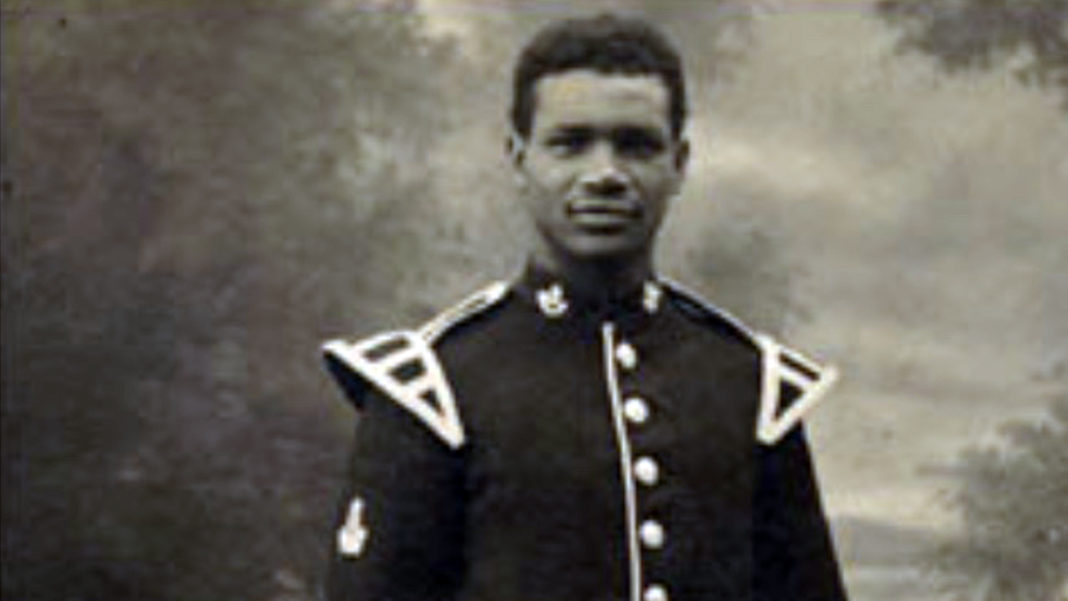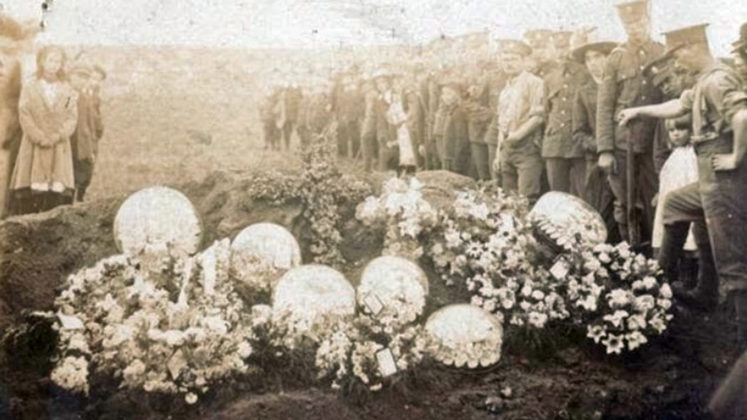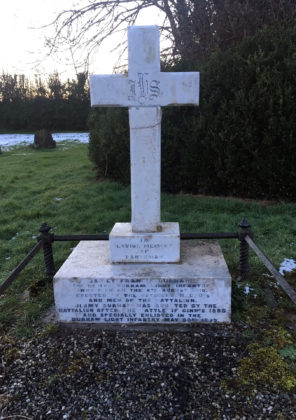In Fermoy’s old military cemetery, behind the Famine graveyard at the back of the soccer pitch, there stands a small white marble cross. It marks the life and final resting place of a historic figure who died at the age of 25, in 1910, 5,500 miles from his birthplace.
Last year, Ballyhooly man Tim O’Mahony received in the post, a news clipping from his sister-in-law Mary O’Mahony in England. Tim’s sister-in-law had read about a minor controversy in the Daily Mirror and, spotting a local connection, sent Tim the story. Intrigued, Tim began his research.
It had all started with “The Empress of Mars”, a 2017 episode of the 55-year-old BBC science-fiction series Doctor Who. A Black actor had been cast as a British soldier battling Martians in 1881. The author of the episode, actor Mark Gatiss, writer and star of The League of Gentlemen, Sherlock and Doctor Who, had protested initially – and mildly – at what he saw as the latest example of the BBC’s drive to become “more representational and make everything less homogeneously white”.
While stressing that he was in no way objecting to the casting of ‘the brilliant young Black actor’ Bayo Gbadamosi as one of the soldiers, Gatiss said his reservation was that “these are soldiers from the South African war, they’ve just been fighting the Zulus. There weren’t any Black soldiers in Victoria’s army”. Deciding to research further the matter, Gatiss soon discovered he was wrong, and the story of James Francies Durham quickly became an obsession for him.
Months later, and across the Irish Sea, Tim O’Mahony similarly became fascinated with Jimmy Durham. Getting in touch with Durham County archivist Liz Bregazzi, Tim soon learned that Jimmy is buried in Fermoy.
Jimmy Durham’s story – but not his life – begins on New Year’s Day, 1886, in the aftermath of the Battle of Ginnis, when Lieutenant Henry de Beauvoir De Lisle found a baby boy on the banks of the Nile. Soldiers of the Durham Light Infantry had defeated an army of Mahdist Sudanese warriors of the Dervish State aboard a nuggar (a barge or supply ship). Many lives were lost, as the Sudanese proved no match for the British boat-mounted Gardner guns. The few surviving Mahdists fled.
De Beauvoir De Lisle later recalled: “We ran up to the boat and seized the towline and there, standing on the bank of the stream alone, was a small curly-haired child under two years of age, dressed in the full war paint of a Sudanese warrior. As he held up his arms for me to take him up, I did so and threw him to Sergeant Stuart to look after with the barge, while the remainder of us pressed on in pursuit.”
Sergeant Stuart, a kindly Scotsman, nicknamed the infant ‘Jimmy Dervish’. Deciding the baby would make ‘a good infantry pet’, Lieutenant De Lisle managed to find out from an injured man that the child’s name was Mustapha and that his father – a Sheikh – had been killed, and his mother had fled. Half a century later, in 1939, the then General Sir Henry de Beauvoir De Lisle recalled “Pointing his finger at me (he) kept repeating ‘Bung-morto’, imitating the sound of the rifle and the result (death).”
We can only imagine, all these years later, how traumatised the child must have been. Everyone he knew was gone, and all around him were dead, cut down by superior British firepower.
“He was a very smart lad,” remembered De Lisle. “He quickly learned to speak English and, when only two-and-a-half, could act as interpreter for the men with the hawkers in camp.”
Sergeant Joseph Francies and his friend Private James Birley, decided to raise the child between them. Giving him a name from either man and a surname from their regiment, little Mustapha became James Francies Durham. He would soon become known to the men of the Durham Light Infantry as Jimmy.
On the long marches, Jimmy sat on the pommel of Sergeant Stuart’s saddle and he endeared himself to the men with his ability to sing and to dance. According to De Lisle’s memories, the plan was that when the regiment reached Cairo – a year on – Jimmy would be left at a mission home. However, when they got there, the sergeants of the DLI begged their superior officer to allow Jimmy to stay with them and they each pledged a rupee (a day’s pay) a month toward his education.
Jimmy travelled to Egypt with the 2nd Battalion, and on to India in 1897, where he learned to play the bugle. In 1898, it was on to Mandalay, where Jimmy would make history. A year later, when he was about 14 – his exact date of birth being a mystery – Jimmy and the sergeants felt he was old enough to enlist.
The British Army had employed Black musicians since the 18th century – and colonial regiments were often Black – but no African had been allowed to join the regular Army on the same terms as white recruits. Given how unusual Jimmy’s situation was, his application went all the way to Victoria herself. Swayed by strong endorsements from the Durham Light Infantry, the Queen approved Jimmy’s enlistment. On May 23, 1889, James Francies Durham – Boy Soldier Number 6758 – became almost certainly the first Black person to be enlisted to the British Army.
In 1902, the DLI was brought home, and Jimmy found himself first in Aldershot and then in the English North-East. The cold, wet climate was daunting for a young man – a teenager by today’s standards – who had known only warm environments, but Jimmy was welcomed by an extended family of former and serving sergeants, and he lived in and around Darlington, Bishop Auckland and Tyneside. He was partially brought up with the family of Sergeant Robson, whose daughter, Stella, he came to regard as a sister.
“Dear Stella,” Jimmy wrote in 1908, when he had been stationed to Cork, “I hope you will always reckon me as your brother. I have known you from when you was a dear little child and I always use to look to your father and dear mother as my mother as well. They have treated me like one of you all. Our band are in hopes of coming to Newcastle as we have been engaged to play at different places and I believe we are going to finish up at Darlington. I shall be very likely to be able to see you all, and, I would like you to hear our band. Your loving brother Jimmy.”
Not long after, Stella named Jimmy – to his delight – the godfather of her baby.
It was during his time in Bishop Auckland that Jimmy met Jane Green, the daughter of a local blacksmith and the sister of a quartermaster sergeant in the Durham Light Infantry. Unlikely as an interracial relationship at that time might seem to us in the 21st century, Jimmy and Jane fell in love and were married in a Newcastle registry office on July 25, 1908.
Stationed to Victoria Barracks in Cork, Jimmy played clarinet and violin in the regimental band, while he also ran the Army Temperance Association for the 2nd Battalion of the DLI, winning an award in 1908 for achieving the highest membership percentage in the Army. A teetotaller, Jimmy rented rooms for temperance meetings over a public house across from the barracks. Some of his colleagues soon realised that attending those meetings gave them a perfect excuse to go to the pub.
As 1910 began, Jenny discovered she was pregnant. Their joy would turn to tragedy when the Irish climate finally took its toll on Jimmy. He contracted pneumonia and died in the Fermoy Military Hospital (now the Aldi car park) on August 8, 1910. He was believed to be 25. There was a huge turn-out for his funeral, with many floral tributes left at the graveside.
Three weeks after Jimmy’s death, Jane gave birth to their daughter, Frances. Jane would later re-marry, a Thomas Cleasby of Bishop Auckland, County Durham, who raised Frances as his own. Frances lived her whole life in Bishop Auckland, passing away in 1998.
Fermoy’s military cemetery is a very peaceful destination for a quiet walk of an evening. It offers a good view of the town’s spires and steeples and – away to the south – Corrin Hill.
Half a world from his birthplace, Jimmy Durham’s (Mustapha’s) grave is well-preserved today. The lettering on his cross has faded a little, this last century and a bit, but that’s okay. Tim O’Mahony promises that – come the summer – he’ll head up there with a tin of paint.
Learn more about Jimmy Durham at the Durham County Record Office.
All images by permission of the Trustees of the Former DLI and Durham County Record Office











